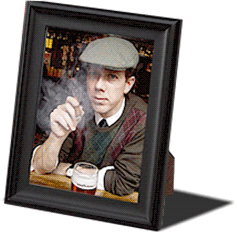In a
chance meeting of the Cigar Society one recent
Thursday afternoon, prompted by late-night jazz
pianist Jeffrey DEAN's trend-setting
example of smoking a Sancho Panza 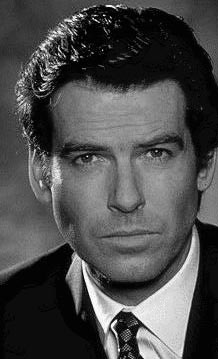 Double
Maduro and drinking a double-gill of Lagavulin
while observing, with a mixture of amusement and
disdain, the lunchtime antics of the University
Club's Admissions Committee, and as staff members
frantically sprayed air fresheners and raised the
AC in the President's Bar to force 6 on the
Beaufort scale in preparation for the arrival of
the candidates, we heard David MORRIS,
founding member of the club's
Beau Brummel Society, discuss the pros and
cons with Mr. DEAN of the Windsor (or
double Windsor) versus the half Windsor (or
Windsor) — "surely Mr. Dean you realize that the
half Windsor, contrary to what its name would
imply, is not half the size of the Windsor but
rather three-quarters" — and ask whether anyone
knew how to construct the peculiarly cylindrical
knot sported by Pierce Brosnan in The
Thomas Crown Affair. Double
Maduro and drinking a double-gill of Lagavulin
while observing, with a mixture of amusement and
disdain, the lunchtime antics of the University
Club's Admissions Committee, and as staff members
frantically sprayed air fresheners and raised the
AC in the President's Bar to force 6 on the
Beaufort scale in preparation for the arrival of
the candidates, we heard David MORRIS,
founding member of the club's
Beau Brummel Society, discuss the pros and
cons with Mr. DEAN of the Windsor (or
double Windsor) versus the half Windsor (or
Windsor) — "surely Mr. Dean you realize that the
half Windsor, contrary to what its name would
imply, is not half the size of the Windsor but
rather three-quarters" — and ask whether anyone
knew how to construct the peculiarly cylindrical
knot sported by Pierce Brosnan in The
Thomas Crown Affair.
Mr. DEAN
immediately called for a consultation of the
groundbreaking tome,
The 85 Ways to Tie a Tie, by
Cambridge physicists Thomas Fink and Yong Mao —
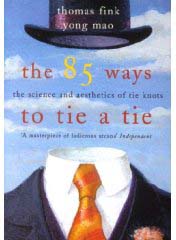 an important work of reference for
resolving disputes and settling gentlemen's
wagers that should not be allowed to leave the
bar under any circumstances. In this book
the authors apply mathematical knot theory to
the study of necktie knots, develop an algebraic
formalism for specifying the "maneuvers"
necessary for creating them, enumerate the
eighty-five distinct ways of knotting a
standard-length necktie, and classify all
possible necktie knots according to size,
symmetry, and balance. The cylindricality
of a necktie knot is determined by the number of
central maneuvers (or "centers") in its
construction — fewer centers implying greater
cylindricality. This fact, along with a
brief inspection of available Google Image data
of Pierce Brosnan wearing neckties, suggests
that the tantalizingly cylindrical knot that Mr.
MORRIS seeks is perhaps a six-move knot
with one center (all necktie knots possessing at
least one center) called the Victoria
(Knot #6 - formula L×R·L×R·L×C·T) or possibly an
interesting variation on the Victoria called the
Prince Albert, in which the knot is
consummated by a final passing of the active end
of the tie through the loops created by the
previous two maneuvers, rather than just the
last. Another possibility—and in this
regard we admit that we require more
photographic data—is a one-center knot
constructed with more than six maneuvers.
There are difficulties with this hypothesis,
however: concerning a one-center, seven-move
knot (Knot #11 - formula L·R×L·R×L·R×C·T), the
physicists remark that, "it is sufficiently
cylindrical to be of questionable taste; more
practically, it is unbalanced and inclined to
lose its shape." Perhaps cigar club
regular (and former Cambridge scholar)
Alexander SHERMAN, who owns two editions
of The 85 Ways and who sports the
elaborately pyramidal, four-center Balthus
(Knot #78 - L·C×R·C×L·C×R·L×C·T) from time to
time, will provide illustrative examples,
unbothered by questions of taste, in
future meetings. Finally, a more
prosaic possibility, indicated by the photograph
included above, is that Mr. Brosnan's knot is a
carefully tied four-in-hand, with its mere four
maneuvers deftly concealing a single center
(Knot #2 - L×R·L×C·T). an important work of reference for
resolving disputes and settling gentlemen's
wagers that should not be allowed to leave the
bar under any circumstances. In this book
the authors apply mathematical knot theory to
the study of necktie knots, develop an algebraic
formalism for specifying the "maneuvers"
necessary for creating them, enumerate the
eighty-five distinct ways of knotting a
standard-length necktie, and classify all
possible necktie knots according to size,
symmetry, and balance. The cylindricality
of a necktie knot is determined by the number of
central maneuvers (or "centers") in its
construction — fewer centers implying greater
cylindricality. This fact, along with a
brief inspection of available Google Image data
of Pierce Brosnan wearing neckties, suggests
that the tantalizingly cylindrical knot that Mr.
MORRIS seeks is perhaps a six-move knot
with one center (all necktie knots possessing at
least one center) called the Victoria
(Knot #6 - formula L×R·L×R·L×C·T) or possibly an
interesting variation on the Victoria called the
Prince Albert, in which the knot is
consummated by a final passing of the active end
of the tie through the loops created by the
previous two maneuvers, rather than just the
last. Another possibility—and in this
regard we admit that we require more
photographic data—is a one-center knot
constructed with more than six maneuvers.
There are difficulties with this hypothesis,
however: concerning a one-center, seven-move
knot (Knot #11 - formula L·R×L·R×L·R×C·T), the
physicists remark that, "it is sufficiently
cylindrical to be of questionable taste; more
practically, it is unbalanced and inclined to
lose its shape." Perhaps cigar club
regular (and former Cambridge scholar)
Alexander SHERMAN, who owns two editions
of The 85 Ways and who sports the
elaborately pyramidal, four-center Balthus
(Knot #78 - L·C×R·C×L·C×R·L×C·T) from time to
time, will provide illustrative examples,
unbothered by questions of taste, in
future meetings. Finally, a more
prosaic possibility, indicated by the photograph
included above, is that Mr. Brosnan's knot is a
carefully tied four-in-hand, with its mere four
maneuvers deftly concealing a single center
(Knot #2 - L×R·L×C·T).
For the record, your
loyal secretary's favorite knot is a
self-releasing eight-move variation on the
Cavendish (Knot #23 -
L×R·L×C·R×L·R×C·T). The Cambridge
scientists remark that, "an inspection of its
sequence reveals it to be the concatenation of
two four-in-hands, one the mirror image of the
other," and quote a colleague with a special
relish for the Cavendish as saying "I'll be
damned if I tie a four-in-hand again."
|
|
Darius
Green and his Flying Machine (1896)
John
Townsend Trowbridge
If
ever there lived a Yankee lad,
Wise or otherwise, good or bad,
Who, seeing the birds fly, didn't jump
With flapping arms from stake or stump,
Or, spreading the tail
Of his coat for a sail,
Take a soaring leap from post or rail,
And wonder why
He couldn't fly,
And flap and flutter and wish and try -
If ever you knew a country dunce
Who didn't try that as often as once,
All I can say is, that's a sign
He never would do for a hero of mine.
An
aspiring genius was D. Green;
The son of a farmer, age fourteen;
His body was long and lank and lean -
Just right for flying, as will be seen;
He had two eyes as bright as a bean,
And a freckled nose that grew between,
A little awry — for I must mention
That be had riveted his attention
Upon his wonderful invention,
Twisting his tongue as he twisted the strings,
And working his face as he worked the wings,
And with every turn of gimlet and screw
Turning and screwing his mouth round too,
Till his nose seemed bent
To catch the scent,
Around some corner, of new-baked pies,
And his wrinkled cheeks and his squinting yes
Grew puckered into a queer grimace,
That made him look very droll in the face,
And also very wise.
And
wise he must have been, to do more
Than ever a genius did before,
Excepting Daedalus of yore
And his son Icarus, who wore
Upon their backs
Those wings of wax
He had read of in the old almanacs.
Darius was clearly of the opinion
That the air is also man's dominion,
And that, with paddle or fin or pinion,
We soon or late shall navigate
The azure as now we sail the sea.
The thing looks simple enough to me;
And if you doubt it,
Hear how Darius reasoned about it.
"The
birds can fly an' why can't I?
Must we give in," says he with a grin,
"That the bluebird an' phoebe
Are smarter'n we be?
Jest fold our hands an' see the swaller
An' blackbird an' catbird beat us holler?
Doos the little chatterin', sassy wren,
No bigger'n my thumb, know more than men?
Just show me that!
Ur prove 't the bat
Hez got more brains than's in my hat.
An' I'll back down, an' not till then!"
He argued further: "Nur I can't see
What's th' use o' wings to a bumblebee,
Fur to git a livin' with, more'n to me; —
Ain't my business
Important's his'n is?
That Icarus
Made a perty muss —
Him an' his daddy Daedalus
They might 'a' knowed wings made o' wax
Wouldn't stand sun-heat an' hard whacks.
I'll make mine o' luther,
Ur suthin' ur other."
And
he said to himself, as he tinkered and planned:
"But I ain't goin' to show my hand
To mummies that never can understand
The fust idee that's big an' grand."
So he kept his secret from all the rest,
Safely buttoned within his vest;
And in the loft above the shed
Himself he locks, with thimble and thread
And wax and hammer and buckles and screws
And all such things as geniuses use; —
Two bats for patterns, curious fellows!
A charcoal-pot and a pair of bellows;
Some wire, and several old umbrellas;
A
carriage-cover, for tail and wings;
A piece of harness; and straps and strings;
And a big strong box,
In which he locks
These and a hundred other things.
His grinning brothers, Reuben and Burke
And Nathan and Jotham and Solomon, lurk
Around the corner to see him work —
Sitting cross-legged, like a Turk,
Drawing the waxed-end through with a jerk,
And boring the holes with a comical quirk
Of his wise old head, and a knowing smirk.
But vainly they mounted each other's backs,
And poked through knot-holes and pried through
cracks;
With wood from the pile and straw from the
stacks
He plugged the knot-holes and caulked the
cracks;
And a dipper of water, which one would think
He had brought up into the loft to drink
When he chanced to be dry,
Stood always nigh,
For Darius was sly!
And whenever at work he happened to spy
At chink or crevice a blinking eye.
He let the dipper of water fly.
"Take that! an' ef ever ye git a peep,
Guess ye'll ketch a weasel asleep!"
And he sings as he locks
His big strong box: —
"The
weasel's head is small an' trim,
An' he is little an' long an' slim,
An' quick of motion an' nimble of limb
An' ef you'll be
Advised by me
Keep wide awake when ye're ketchin' him!"
So
day after day
He stitched and tinkered and hammered away,
Till at last 'twas done —
The greatest invention under the sun!
"An' now," says Darius, "hooray fur some fun!"
'Twas
the Fourth of July,
And the weather was dry,
And not a cloud was on all the sky,
Save a few light fleeces, which here and there,
Half mist, half air,
Like foam on the ocean went floating by
just as lovely a morning as ever was seen
For a nice little trip in a flying-machine.
Thought cunning Darius: "Now I shan't go
Along 'ith the fellers to see the show.
I'll say I've got sich a terrible coughl
An' then, when the folks 'ave all gone off,
I'll hev full swing fur to try the thing,
An' practise a little on the wing."
"Ain't goin' to see the celebration?"
Says brother Nate. "No; botheration
I've got sich a cold - a toothache - I
My gracious - feel's though I should fly!"
Said Jotham, "Sho!
Guess ye better go."
But Darius said, "No!
Shouldn't wonder 'f you might see me, though,
'Long 'bout noon, ef I git red
O' this jumpin', thumpin' pain 'n my head."
For all the while to himself he said: —
"I
tell ye what!
I'll fly a few times around the lot,
To see how 't seems, then soon's I've got
The hang o' the thing, ez likely's not,
I'll astonish the nation,
An' all creation,
By flyin' over the celebration!
Over their heads I'll sail like an eagle;
I'll balance myself on my wings like a sea-gull:
I'll dance on the chimbleys; I'll stand on the
steeple;
I'll flop up to winders an' scare the people!
I'll light on the liberty-pole, an' crow;
An' I'll say to the gawpin' fools below,
'What world's this 'ere
That I've come near?'
Fur I'll make 'em b'lieve I'm a chap f'm the
Moon;
An' I'll try to race 'ith their ol'balloon!"
He crept from his bed;
And, seeing the others were gone, he said,
"I'm gittin' over the cold 'n my head."
And away he sped,
To open the wonderful box in the shed.
His
brothers had walked but a little way,
When Jotham to Nathan chanced to say,
"What is the feller up to, hey!"
"Don'o'- the's suthin' ur other to pay,
Ur he wouldn't 'a' stayed tu hum to-day."
Says Burke, "His toothache's all 'n his eye!
He never'd missed a Fo'th-o'-July,
Ef he hedn't got some machine to try."
Then Sol, the little one, spoke: "By darn!
Le's hurry back an' hide 'n the barn,
An' pay him fur tellin' us that yarn!"
"Agreed!" Through the orchard they creep back
Along by the fences, behind the stack,
And one by one, through a hole in the wall,
In under the dusty barn they crawl,
Dressed in their Sunday garments all;
And a very astonishing sight was that,
When each in his cobwebbed coat and hat
Came up through the floor like an ancient rat
And there they hid;
And Reuben slid
The fastenings back, and the door undid.
"Keep dark!" said he,
"While I squint an' see what the' is to see."
As
knights of old put on their mail -
From head to foot an iron suit
Iron jacket and iron boot,
Iron breeches, and on the head
No hat, but an iron pot instead,
And under the chin the bail,
(I believe they called the thing a helm,)
Then sallied forth to overwhelm
The dragons and pagans that plagued the earth
So this modern knight
Prepared for flight,
Put on his wings and strapped them tight
Jointed and jaunty, strong and light —
Buckled them fast to shoulder and hip;
Ten feet they measured from tip to tip
And a helm had he, but that he wore,
Not on his head, like those of yore,
But more like the helm of a ship.
"Hush!"
Reuben said,
"He's up in the shed!
He's opened the winder — I see his head!
He stretches it out, an' pokes it about,
Lookin' to see 'f the coast is clear,
An' nobody near; —
Guess he don' o' who's hid in here!
He's riggin' a spring-board over the sill!
Stop laffin', Solomon! Burke, keep still!
He's a climbin' out now — Of all the things!
What's he got on? I vum, it's wings!
An' that 'tother thing? I vum, it's a taill
An' there he sits like a hawk on a rail!
Steppin' careful, he travels the length
Of his spring-board, and teeters to try its
strength.
Now he stretches his wings, like a monstrous
bat;
Peeks over his shoulder; this way an' that,
Fur to see 'f the' 's any one passin' by;
But the' 's on'y a caf an' goslin nigh.
They turn up at him a wonderin' eye,
To see — The dragon! he's goin' to fly!
Away he goes! Jimminy! what a jump!
Flop — flop — an' plump
To the ground with a thump!
Flutt'rin' an' flound'rin' all 'n a lump!"
As a
demon is hurled by an angel's spear,
Heels over head, to his proper sphere —
Heels over head, and head over heels,
Dizzily down the abyss he wheels —
So fell Darius. Upon his crown,
In the midst of the barn-yard, he came down,
In a wonderful whirl of tangled strings,
Broken braces and broken springs,
Broken tail and broken wings,
Shooting-stars, and various things;
Barn-yard litter of straw and chaff,
And much that wasn't so sweet by half.
Away with a bellow fled the calf,
And what was that? Did the gosling laugh?
'Tis a merry roar from the old barn-door.
And he hears the voice of Jotham crying,
"Say, D'rius! how do you like flyin'?"
Slowly,
ruefully, where he lay,
Darius just turned and looked that way,
As he stanched his sorrowful nose with his cuff.
"Wal, I like flyin' well enough,"
He said; "but the' ain't such a thunderin' sight
O' fun in 't when ye come to light."
I just have room for the MORAL here:
And this is the moral — Stick to your sphere.
Or if you insist, as you have the right,
On spreading your wings for a loftier flight,
The moral is - Take care how you light.
|
 Informal smokers at the Tower Club
(Civic Opera Building, 39th floor) have been
scheduled for Tuesday, July 11 and Tuesday, July
25. Attendance is expected to be spotty
(especially tonight, with several regulars,
including your secretary, being out of town), so
in the words of David O'CONNOR (following
Shaw
and Churchill), bring a friend, if you have
one. All University Club and Tower Club
members are invited, and guests interested in a
smoke and a cocktail in good company are
welcome. BYO cigars and each member signs
his own chit.
Informal smokers at the Tower Club
(Civic Opera Building, 39th floor) have been
scheduled for Tuesday, July 11 and Tuesday, July
25. Attendance is expected to be spotty
(especially tonight, with several regulars,
including your secretary, being out of town), so
in the words of David O'CONNOR (following
Shaw
and Churchill), bring a friend, if you have
one. All University Club and Tower Club
members are invited, and guests interested in a
smoke and a cocktail in good company are
welcome. BYO cigars and each member signs
his own chit.  Double
Maduro and drinking a double-gill of Lagavulin
while observing, with a mixture of amusement and
disdain, the lunchtime antics of the University
Club's Admissions Committee, and as staff members
frantically sprayed air fresheners and raised the
AC in the President's Bar to force 6 on the
Beaufort scale in preparation for the arrival of
the candidates, we heard David MORRIS,
founding member of the club's
Beau Brummel Society, discuss the pros and
cons with Mr. DEAN of the Windsor (or
double Windsor) versus the half Windsor (or
Windsor) — "surely Mr. Dean you realize that the
half Windsor, contrary to what its name would
imply, is not half the size of the Windsor but
rather three-quarters" — and ask whether anyone
knew how to construct the peculiarly cylindrical
knot sported by Pierce Brosnan in The
Thomas Crown Affair.
Double
Maduro and drinking a double-gill of Lagavulin
while observing, with a mixture of amusement and
disdain, the lunchtime antics of the University
Club's Admissions Committee, and as staff members
frantically sprayed air fresheners and raised the
AC in the President's Bar to force 6 on the
Beaufort scale in preparation for the arrival of
the candidates, we heard David MORRIS,
founding member of the club's
Beau Brummel Society, discuss the pros and
cons with Mr. DEAN of the Windsor (or
double Windsor) versus the half Windsor (or
Windsor) — "surely Mr. Dean you realize that the
half Windsor, contrary to what its name would
imply, is not half the size of the Windsor but
rather three-quarters" — and ask whether anyone
knew how to construct the peculiarly cylindrical
knot sported by Pierce Brosnan in The
Thomas Crown Affair.
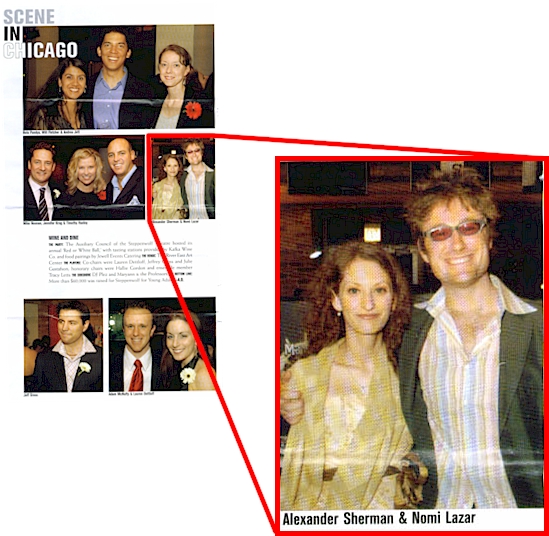

 an important work of reference for
resolving disputes and settling gentlemen's
wagers that should not be allowed to leave the
bar under any circumstances. In this book
the authors apply mathematical knot theory to
the study of necktie knots, develop an algebraic
formalism for specifying the "maneuvers"
necessary for creating them, enumerate the
eighty-five distinct ways of knotting a
standard-length necktie, and classify all
possible necktie knots according to size,
symmetry, and balance. The cylindricality
of a necktie knot is determined by the number of
central maneuvers (or "centers") in its
construction — fewer centers implying greater
cylindricality. This fact, along with a
brief inspection of available Google Image data
of Pierce Brosnan wearing neckties, suggests
that the tantalizingly cylindrical knot that Mr.
MORRIS seeks is perhaps a six-move knot
with one center (all necktie knots possessing at
least one center) called the Victoria
(Knot #6 - formula L×R·L×R·L×C·T) or possibly an
interesting variation on the Victoria called the
Prince Albert, in which the knot is
consummated by a final passing of the active end
of the tie through the loops created by the
previous two maneuvers, rather than just the
last. Another possibility—and in this
regard we admit that we require more
photographic data—is a one-center knot
constructed with more than six maneuvers.
There are difficulties with this hypothesis,
however: concerning a one-center, seven-move
knot (Knot #11 - formula L·R×L·R×L·R×C·T), the
physicists remark that, "it is sufficiently
cylindrical to be of questionable taste; more
practically, it is unbalanced and inclined to
lose its shape." Perhaps cigar club
regular (and former Cambridge scholar)
Alexander SHERMAN, who owns two editions
of The 85 Ways and who sports the
elaborately pyramidal, four-center Balthus
(Knot #78 - L·C×R·C×L·C×R·L×C·T) from time to
time, will provide illustrative examples,
unbothered by questions of taste, in
future meetings. Finally, a more
prosaic possibility, indicated by the photograph
included above, is that Mr. Brosnan's knot is a
carefully tied four-in-hand, with its mere four
maneuvers deftly concealing a single center
(Knot #2 - L×R·L×C·T).
an important work of reference for
resolving disputes and settling gentlemen's
wagers that should not be allowed to leave the
bar under any circumstances. In this book
the authors apply mathematical knot theory to
the study of necktie knots, develop an algebraic
formalism for specifying the "maneuvers"
necessary for creating them, enumerate the
eighty-five distinct ways of knotting a
standard-length necktie, and classify all
possible necktie knots according to size,
symmetry, and balance. The cylindricality
of a necktie knot is determined by the number of
central maneuvers (or "centers") in its
construction — fewer centers implying greater
cylindricality. This fact, along with a
brief inspection of available Google Image data
of Pierce Brosnan wearing neckties, suggests
that the tantalizingly cylindrical knot that Mr.
MORRIS seeks is perhaps a six-move knot
with one center (all necktie knots possessing at
least one center) called the Victoria
(Knot #6 - formula L×R·L×R·L×C·T) or possibly an
interesting variation on the Victoria called the
Prince Albert, in which the knot is
consummated by a final passing of the active end
of the tie through the loops created by the
previous two maneuvers, rather than just the
last. Another possibility—and in this
regard we admit that we require more
photographic data—is a one-center knot
constructed with more than six maneuvers.
There are difficulties with this hypothesis,
however: concerning a one-center, seven-move
knot (Knot #11 - formula L·R×L·R×L·R×C·T), the
physicists remark that, "it is sufficiently
cylindrical to be of questionable taste; more
practically, it is unbalanced and inclined to
lose its shape." Perhaps cigar club
regular (and former Cambridge scholar)
Alexander SHERMAN, who owns two editions
of The 85 Ways and who sports the
elaborately pyramidal, four-center Balthus
(Knot #78 - L·C×R·C×L·C×R·L×C·T) from time to
time, will provide illustrative examples,
unbothered by questions of taste, in
future meetings. Finally, a more
prosaic possibility, indicated by the photograph
included above, is that Mr. Brosnan's knot is a
carefully tied four-in-hand, with its mere four
maneuvers deftly concealing a single center
(Knot #2 - L×R·L×C·T). 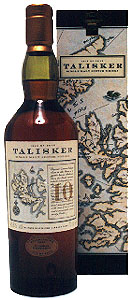 big city all sell Talisker.
But! I spent about 36 hours in a small
house right by their distillery in
Scotland. It is extremely beautiful,
right by the water, in what looks like a
small, narrow, and steep fjord. There is a
small very "pitoresk" local bar next door
where true Scottish old men brought up on
whisky gather and share their
laughter... So the problem is this: I
didn't see one single boat, not one single
truck, not even a pick-up. So
where does the whisky actually come
from? Is this also outsourced to
China? If so, tanker accidents would
become much more appreciated, probably even
massive tourist attractions. In fact the
shipmakers could probably get sponsorships
from small shore communities to build in
thinner steel, steel prices could go down,
insurgences go up and.... We're living
in a world of change! My 10 cents
to a good 2am whisky discussion...
big city all sell Talisker.
But! I spent about 36 hours in a small
house right by their distillery in
Scotland. It is extremely beautiful,
right by the water, in what looks like a
small, narrow, and steep fjord. There is a
small very "pitoresk" local bar next door
where true Scottish old men brought up on
whisky gather and share their
laughter... So the problem is this: I
didn't see one single boat, not one single
truck, not even a pick-up. So
where does the whisky actually come
from? Is this also outsourced to
China? If so, tanker accidents would
become much more appreciated, probably even
massive tourist attractions. In fact the
shipmakers could probably get sponsorships
from small shore communities to build in
thinner steel, steel prices could go down,
insurgences go up and.... We're living
in a world of change! My 10 cents
to a good 2am whisky discussion... 